Civil Liberties, Criminalizing Dissent, Habeas Corpus, Human Rights, Surveillance, Truth to Power
Podcast: Play in new window | Download
Updates:
- What Does OWS Mean? – Michael Steven Smith
- Liberty Square Symbolic, At The Foot Of Capitalism
- Redistribution of Money and Power
- Nationally Coordinated Bust: Oakland Mayor Says She Was On Conference Call With 18 Mayors
- Michael Smith’s Story Of Liberty Square Police Raid
- NYTimes Candid With Spoils Of Libya Invasion
- Who Killed Che? How The CIA Got Away With Murder
—
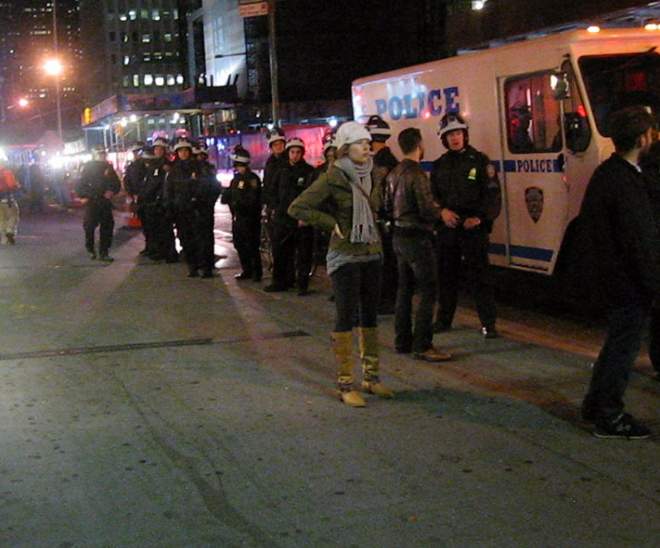
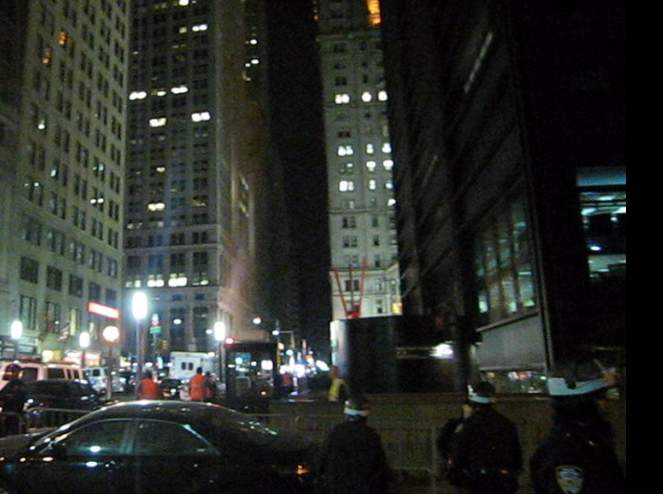
Legal Fallout From OWS Raid In New York City
Very early last Tuesday morning, teams of New York City Police in full riot gear descended upon the 2 acre park known by protesters as Liberty Square, home of Occupy Wall Street. Hundreds were arrested as police and bulldozers dismantled and tore down tents, confiscated gear, computers and clothes. Plain clothes construction workers assisted in filling large dump trucks with personal belongings and equipment from the encampment. The massive eviction is one of many reported across the country in past weeks.
Attorney Danny Alterman:
- There’s been a core group of 20 or 30 people working on issues that effect the occupiers down on Wall Street.
- We talked strategy, we created a document that would decide and get us into court in the morning.
- We are arranged to meet Judge Billings at 6AM
- We wanted to judge to issue a temporary restraining order which means that the police could not continue to evict people and order them back into the park with their belongings.
- We got a signed order from the judge to let our clients back in.
- We served Brookfield Properties which is the owner of the park, the city of New York through the corporation council, and the police department by fax with a copy of the order.
- What this reminded me of is was what had happened precisely in 1971 when the Attica Massacre happened. When we got a court order to go in because people were dying and getting shot, inside and the prison authorities refused to open up for medics and lawyers, causing the death of other people.
- Finally I said to one guy who was getting on me and getting on another lawyer that was there. I said listen, this reminds me of Attica, he said I’ve never been to Attica, I said we can make those arrangements.
- I said, you realize you’re violating a court order, and in contempt of court.
- Mayor Bloomberg in the course of us getting an order and finding out about it, had decided to close the park, which was the complete opposite of what the court said which was to re-open the park.
- Homeland Security was definitely there, you can tell by the crew cuts and the shoes.
- There was a temporary restraining order issued at 6:30 AM. We didn’t think Judge Billings would stay on the case. She didn’t. We went back at 11:30AM, and once a judge was assigned had about a 2 hour argument.
- We received papers as we walked into court from the city which contained a affidavit which is a legal document swearing to issues of public safety, health issues, other kinds of issues, that was clearly prepared before they evicted the protesters 10 hours before.
- What this means is that the city knew in preparing these papers that there was going to be a legal challenge.
- Brookfield Properties a descendant from US Steel. This is direct descendant from US Steel.
- We may be looking at 21st century speech assembling petitioning.
- Its a privilege and an honor to represent these people and I think the people have the pulse of the country and its happening.
Guest – Civil rights attorney Danny Alterman, Danny is part of the Liberty Park Legal Working Group.
———–
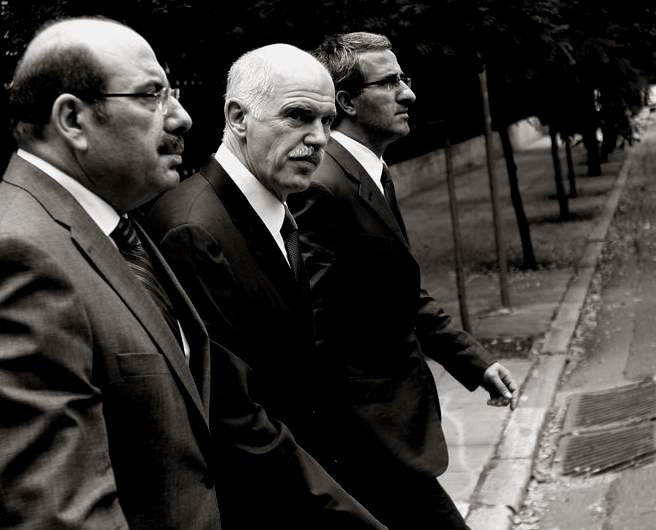
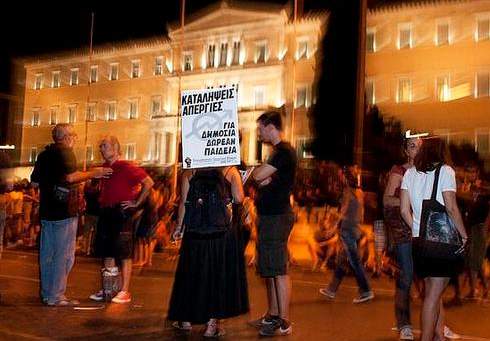
Global Capitalist Crisis and Long Term US Unemployment
Thousands around the country continue to stand in solidarity with the Occupy Wall Street movement. The movement claims to defend the 99 percent of Americans against the wealthiest 1 percent who control 50 percent of the wealth in the United States. Meanwhile, long term US unemployment is taking a heavy toll socially. The social costs are high, the stress, tension and anxiety within families, the costs of counseling, and much more. We discuss these topics with returning guest, economics professor Rick Wolff who says, enormous wealth could be produced right now with the unused tools and raw materials put together with the nation’s unemployed people, we could rebuild our cities and infrastructure.
Professor Rick Wolff:
- Debt is always a sign of something else. You go into debt because you see a need or opportunity for which you don’t have the money and so you either forego the need or opportunity or borrow.
- If you see off the chart increases of debt like you do in the case of individuals in the last 30 years, or corporations and in the case of governments at a slow rate over the last 30 years, then you have to ask the question why?
- The 1970s come along and that period of 150 years of rising wages is over. It’s over because the computer replaces large numbers of people they don’t need to be hired. Production is moving out of the United States.
- Immigrants are flowing into the United States because the uneven development of the world economy, makes them poorer and the United States look more attractive.
- Suddenly employers have the greatest of all possibilities, they don’t have to raise wages anymore.
- Employers: If you’re not happy here, there’s a lot of other people that will be.
- Meanwhile you’re drumming into the American people, you should live better, everybody should have more. . .
- You put the American people into an impossible situation. You might have been able to handle it by having a real political leadership in America. We didn’t have that conversation, no politician wanted to be the bearer of that bad news.
- What can the American people do? They did more work. You borrow money. Whenever there’s a debt, there’s a lender and a borrower. This is a strange game to blame the borrower.
- Greece, now you have a situation that invites all kinds of corporations to make a decision.
- When the Greek Drachma, their old currency disappears to be replaced by the Euro, all kinds of business decisions became different.
- There was no border, you couldn’t have a tariff as you could before. Once you have a uniform currency you can’t do that. It’s like Tennessee erecting a tariff against products from Kentucky.
- Who lent to the Greek government? Above all, the French and German banks.
- It’s the banks that are making money because of the concentration of production in their country, with which they came to the poor countries and said hey, we got a lot of money you got a lot of need.
- A lot of money has been made off of Greek debt. It’s not some gift to the folks in Greece.
- As usual its a partnership and deciding that its all the fault of the Greeks as if the French and German banks didn’t make a fortune off of this.
- Italy is now where Greece was approximately six to eight months ago.
- The debt of Italy is four to five times the debt of Greece. Italy is the eight largest economy on this planet. They have over 2 trillion dollars of debt outstanding. We sell a very important part of our output to the Europeans.
- I would demand now, an immediate government employment program. A commitment by the United States government.
Guest – Richard D. Wolff is Professor of Economics Emeritus, University of Massachusetts, Amherst where he taught economics from 1973 to 2008. He is currently a Visiting Professor in the Graduate Program in International Affairs of the New School University, New York City. He also teaches classes regularly at the Brecht Forum in Manhattan.
————————
Civil Liberties, Criminalizing Dissent, Human Rights, Surveillance, Truth to Power
Podcast: Play in new window | Download
Updates:
—-
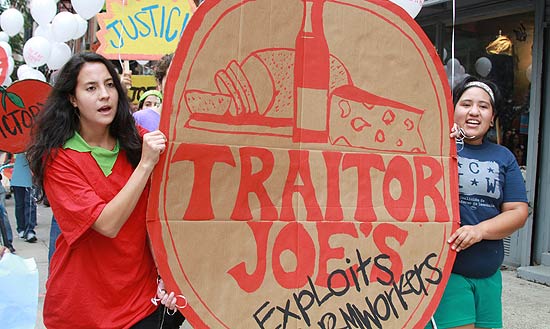

Brooklyn Fair Food Festival Urges Trader Joe’s To Support Fair Labor Standards For Farm Workers.
Brooklyn, community members joined the Coalition of Immokalee Workers an organization of farm workers in Southern Florida to call on Trader Joe’s to live up to its public image as an ethical corporation by participating in the Campaign For Fair Food. The Campaign seeks to improve wages and working conditions for Florida tomato pickers by calling on major buyers of tomatoes to pay a premium of one penny more per pound for their tomatoes, ensure that this penny is passed down directly to farmworkers, and work together with the CIW to establish and implement a code of conduct in their supply chains. Sound gathered and interviews by Michael Ratner.
—
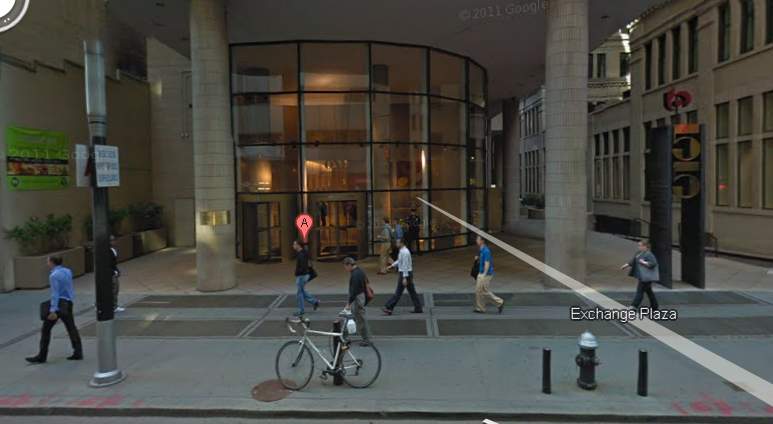

Wall Street Firms Spy On Protesters In Tax Funded Center
It was six years in the planning according to recently uncovered documents that show 150 million taxpayer dollars funding a round the clock surveillance security center in Lower Manhattan where Wall Street firms sit along side the NYPD. That’s right, high wage Wall Street firm workers will sit next to MTA, NYPD and Port Authority employees and monitor the near 3000 spy cameras installed in the area. Any individual can be tracked by the color of their clothes or face recognition with live feed cameras that also read license plates. In her article Wall Street Firms Spy on Protesters in Tax-Funded Center, investigative journalist Pam Martens also focused on the corrupt alliance of indicted corporate firms merging with police to spy on law abiding citizens funded by tax payer money. Her latest article in Counterpunch titled Financial Giants Put New York City Cops On Their Payroll exposes how private Wall Street corporations are allowed to order a paid detail of New York City Police at an average of 37.00 an hour. The taxpayer again picks up the tab for training, uniforms and any law suit brought from “following illegal instructions from its corporate master.”
Pam Martens:
- I had the benefit of managing my own client base, so Wall Street did not have the same type of leverage over me that it has over so many of its other workers.
- About 10 years into my tenure, I started reading about the private justice system Wall Street had set up where both customers and employees had to waive their rights to the nation’s courts.
- I started complaining and advocating against that. They were self policing, that was totally corrupt.
- Then I started protesting in the streets, filed a large federal rights action, and testified at several venues, the SEC and the Federal Reserve.
- The story is much more insidious than I first realized. I came across a 60 Minutes expose on the counter-terrorism unit of the NYPD. At the very end of the piece there is a tour of the facility, the one that I’m talking about.
- The Lower Manhattan Security Coordination Center, which is jointly operated by Wall Street’s potential felons and the largest law enforcement police force in the country. It’s actually at 55 Broadway.
- Goldman Sachs and Citigroup, sitting next to public sector employees.
- It consists of 3 rows of computer terminals. 2 of those rows are dominated by Wall Street firms, the NYSE, the Federal Reserve and only one row has uniformed officers.
- I called up the producer at 60 Minutes, and said you had to have seen all these people in civilian clothes.
- The NYPD has used tax payer money to have one massive computer to look at all the individual feeds. That massive computer has artificial intelligence.
- There is absolutely no explanation for why Wall Street firms get to sit there and have access confidential databases that belong to the NYPD. I have 2 FOIA requests with the NYPD. Every detail of us is under surveillance.
- There are some reports, they can zero in and read text messages on your cell phone.
- These Wall Street firms that have committed crime after crime, after crime, they’re currently under 51 separate state and federal investigations for securities fraud and essentially looting the public. They’re the partners, the potential felons, are the partners with the law enforcement.
- Credit Suisse v. Billing, 551 U.S. 264 (2007), was a decision by the Supreme Court of the United States, which held that Congress’ creation of the United States Securities and Exchange Commission (SEC) implicitly exempted the regulated securities industry from antitrust lawsuits under other existing laws. Justice Thomas dissented, arguing that the laws creating the SEC explicitly mention that securities regulations are in addition to, not instead of, existing law.
Guest – Pam Martens worked on Wall Street for 21 years. She spent the last decade of her career advocating against Wall Street’s private justice system, which keeps its crimes shielded from public courtrooms. She has been writing on public interest issues for CounterPunch since retiring in 2006. She has no security position, long or short, in any company mentioned in this article.
—————————————————————————————————-
Civil Liberties, Criminalizing Dissent, Habeas Corpus, Human Rights, Truth to Power, War Resister
Podcast: Play in new window | Download
Updates:
—-
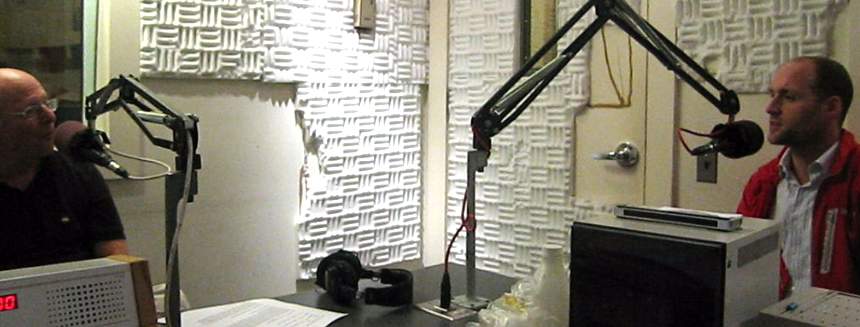
Occupy Wall St. – Think Tanks and Organizing
Like many protesters down at Liberty Plaza, Tim Weldon has been under employed for years. He’s got a Masters Degree, one in economic development and 10 years experience in international business. He’s now part of Occupy Wall St working with the think tank group. The first step is taking all the ideas and solutions generated from the movement and collating them into a more accessible format.
Tim Weldon:
- The food is hit or miss, you cycle through, get in line, whatever is there at the time, that’s what you get.
- There’s sanitation, first aid, media press, PR. The group that I’m specifically on is the think tank.
- Similar to a lot of people, said, how do I fit in and what exactly is going on? Like most people I got down there and thought how do I fit in to where I most belong? So, I walked around for most of the day, I got to the stage to where I thought, what I would be good at and what could fit in here.
- Then I found some very like minded people who were thinking the same thing, to sort of create an opportunity for all of the ideas to be collected, organized and collated together. The think tank, we’re going to have four different receptacles for information.
- One will be from the park where we’ll have discussion groups on topics. We’re trying to develop a web platform within the NYCGA.net .
- We’re getting all walks of life, one of the best participants was a disabled man.
- The discussions have been so positive and energetic and we’re saying how can we take both of these ideas and forget about the established dichotomies and all this dogma that people are working with.
- Let’s go straight to us right here, let’s create a productive use of this information where everybody is happy.
- I found that everybody I’m working with open and wants to listen, wants to learn, the way most of the groups work is there’s no leaders. I like to draw differentiation between leaders and leadership.
- People are coming here after they’ve been setup and more streamline or coming here to get things more streamline. Take a step back, try to envision something different.
- Everybody seemed united around, well, they want it clean, lets get things clean.
- People were doing what had to be done and getting things done, but there was a subtle apprehension there, what’s going to happen tomorrow? How serious is it going to be? How much are we going to have to fight, not in a physical sense but in all sort of senses for this space?
- Most of the country can get behind the fact, whether your left or right, whatever it is, you’ve got some apprehension about what’s going on in the country right now and that’s what we’re trying to voice.
- Holding that space is really important to the movement.
- Maintaining that park is very important because it is the symbol. You control us in every other aspect of our lives perhaps, but you don’t control us here.
- I left my job last week, this to me is the movement of our generation.
Guest – Tim Weldon is from upstate New York. He quit his job to dedicate his time to help the Occupy Wall Street movement. Specifically, Tim is working with the think tank group, pulling together ideas and solutions pouring in from around the country and making them more accessible to media and others. Tim has a Master’s Degrees in economic development. He also has 10 years experience in international business.
—
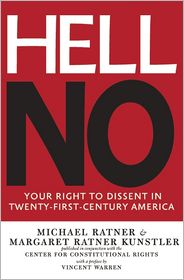
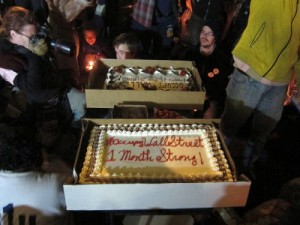
Occupy Wall Street: Attorney Margaret Ratner-Kunstler Part 2
We continue the “know your rights” discussion on the Occupy Wall St protests, encampments and demonstrations. Last week we talked about how the NYPD collected intelligence data from protesters. When more than 800 people on the Brooklyn Bridge were arrested a few weeks ago, that event was more about getting protester names and pedigree information into databases says attorney Margaret Ratner-Kunstler with the National Lawyers Guild. Meanwhile students from 90 colleges and universities are protesting the price of education, being saddled with student loan debt and more. There are many aspects to knowing your rights as a demonstrator and we’ll discuss more details today with returning guest attorney Margaret Ratner Kunstler.
Attorney Margaret Ratner-Kunslter:
- You can be anywhere to express your first amendment rights. I think occupation is a new first amendment right.
- The occupation movement is relatively new and we haven’t really tested it in the federal courts or state courts and I think we have a good opportunity to do that. They haven’t got people out of the park because when they threatened to do so, the number of people swelled from about 1000 to 6000.
- I think it was a question of mass support for the demonstration that prevented the police from clearing the park.
- Seattle was a successful protest (1999) it interfered with delegates going to the convention center and it was a very embarrassing thing for the police because it was an international conference.
- Kettling is those big iron fences, they put people in these fenced areas to keep them separated so they can be crowd control.
- By the time Michael and I finished this book, we were saying, oh, they’re never going to be able to demonstrate again. But lo and behold, a new form of demonstrations is upon us, and its just thrilling.
- The police officer who pepper sprayed the young woman, lost ten vacation days.
- That was the immediate result after Seattle, there were fusion centers. Those are centers where the FBI and local police get together and collect information.
- Every time they hear of a demonstration, they try to prevent it, they have many ways to dissuade people from coming to demonstrations.
- Militarization of the police: It was no longer a family occupation to protest against the war, it was a dangerous thing to do. You got stuck in a pen and you couldn’t get out.
Guest – Magaret Ratner-Kunstler, an attorney in private practice. As education director at the Center for Constitutional Rights, she originated the Movement Support Network and authored “If an Agent Knocks.” Margaret is the President of the William Moses Kunstler Fund for Racial Justice, a foundation established in 1995 in the memory of her late husband to combat racism in the criminal justice system.
——————————-
Civil Liberties, Habeas Corpus, Human Rights, Prosecution of the Bush Administration, Surveillance, Torture, Truth to Power
Podcast: Play in new window | Download
Updates:
—
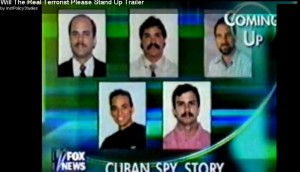
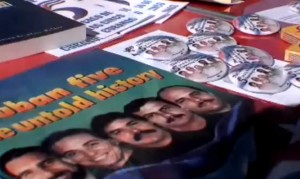
Saul Landau – Will the Real Terrorist Please Stand Up
We welcome back internationally known scholar and film maker, Saul Landau. We talk with Saul about his recent article, A Judge Grants Dubious Probation and his film, Will the Real Terrorist Please Stand Up? In his article, Saul writes about the release of Cuban Five member Rene Gonzalez who was released on parole in Miami for 3 years. Miami isn’t a good place for an admitted Cuban agent, Saul writes, and he’s a man who infiltrated the anti-Castro Brothers to the Rescue; his life would be in danger from Cuban exile terrorist groups. Earlier this year, Gonzalez had asked the court to allow him to return to Cuba where his family lives. As many listeners may remember the Cuban Five are five Cuban men who are in U.S. prison, serving four life sentences and 75 years collectively after being wrongly convicted in U.S. federal court. They were accused of committing espionage conspiracy against the United States.
Saul Landau:
- The classification of terrorist fall into 3 categories. The good, the bad and the crazy.
- The good terrorists are freedom fighters. Those are people still walking around Miami because they’ve directed their violence against Cuba, who is a bad guy.
- Then there are the bad terrorists and of course they’re all Muslims. Then there are the other terrorists who are neither good or bad, simply crazy like the guy who did the Oklahoma City bombing and this Norwegian guy who did this massacre.
- The idea in the film “Will The Real Terrorist Please Stand Up” is that people don’t know what the Cuban Revolution was and they don’t much about US policy. Ironically, Cuba is now showing this film in their high schools having found out their own students are ignorant about their own history.
- Cuba had very little recourse over terrorism for decades, other than to infiltrate the groups that were planning violence against Cuba and try therefore to impede their terrorist actions.
- The Cuban Five were looking for information that would help them stop bombings in Cuba.
- They were spying on Cuban exile groups that were based in south Florida.
- When the Soviets went away in 1991, Cuba had very little recourse in terms of economic survival other than tourism. As she began to get her tourism revved up, so to did the Cuban exiles in Miami start to level their guns; deterring tourists from going.
- Posada Carriles: We have interviews of him in the film, and of course he denies he did any of it in the New York Times.
- He gets honored, he got the keys to Hialeah, Florida for doing things he denies he has done. If he hasn’t done all these things, why would they honor him?
- Posada Carriles and Orlando Bosch hired two Venezuelans to plant bombs in an airplane bathroom, which would go off after the two bombers left the plane.
- The Venezuelans confessed they were hired by Posada and Orlando. The Venezuelan police arrested them. They both got out for weird reasons. Posada escaped with the help of a 50 thousand dollar bribe to the warden of the prison.
- When Posada got out he went to work for Col. Oliver North. His next job was financed by the Cuban American National Foundation, which was the heart of the anti-Castro lobby. Orlando Bosch died after getting honored at the University of Miami. Orlando Bosch was pardoned by George HW Bush.
- Rene Gonzales: Essentially she’s put a bulls eye on his chest.
- After the United States assassinates a U.S. citizen abroad because it is said he planning terrorist acts against the United States. Under that precedent would Cuba not have the same right to send assassins into Miami and gun a whole bunch of people who are Cuban citizens in the United States who are plotting against Cuba?
- People can screen the film at CinemaLibreStudio.com
Guest – Saul Landau, a senior fellow at the Institute for Policy Studies at the Berkeley Graduate School of Journalism, has produced more than 40 films in his career, most concerned with human rights. His latest documents 50 years of US-Cuba relations in which violent Cuban exiles–backed by the CIA–tried to dislodge Cuba’s government, and of five Cuban spies, now in US prisons, who tried to stop this US-sponsored terrorism.
——-
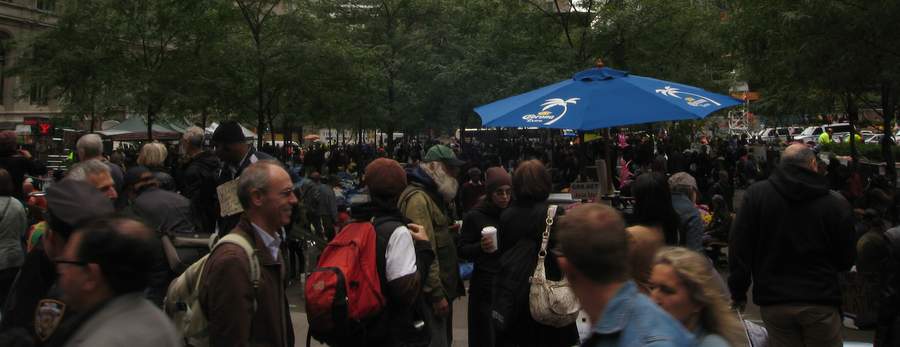
Occupy Wall Street: Liberty Square, New York City
We go now to hear a wide range of voices from One Liberty Plaza at the Occupy Wall Street encampment. During these interviews, the Occupy Wall Street movement remained a collective with people of many political persuasions. In this early period of austerity measures, they call themselves the 99% that will no longer tolerate the greed and corruption of the 1% and claim they’re using the revolutionary Arab Spring strategy to achieve results and encourage the use of nonviolence and civil disobedience.
Our own Heidi Boghosian spoke with activists, union workers, a lawyer and many more about where the movement is going, the support for it and a focus on demands such as pushing for the redistribution of wealth from the top 1 percent of Americans.
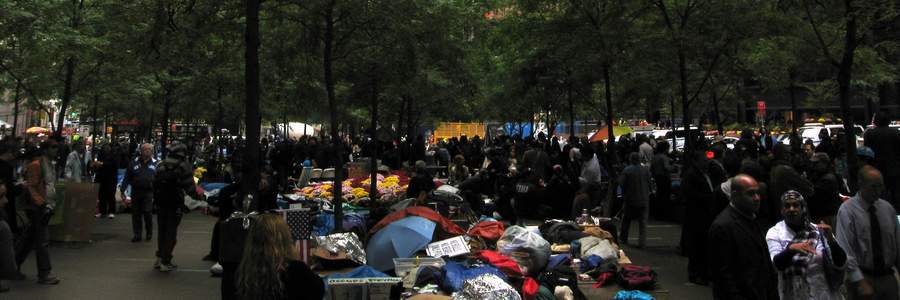
Civil Liberties, Criminalizing Dissent, FBI Intrusion, Human Rights, Targeting Muslims, Truth to Power
Podcast: Play in new window | Download
Updates:
————–

Irvine 11 Case Update
Earlier this year 11 Muslim students were arrested on charges for disrupting a speech of the Israeli ambassador to the United States, Michael Oren. The incident took place last year on the campus of the University of California at Irvine. The local District Attorney claims that the students had no right to disrupt the event, charging them with conspiracy to shut down the ambassador’s speech, even though he was able to complete the speech. Supporters claim that the Muslim students’ actions are protected by the first Amendment, and that are being charged for being vocal critics of Israel.
Last month, an Orange County court has found 10 Muslim students guilty of two misdemeanors. Facing up to one year in jail on multiple misdemeanor charges, they were sentenced to three years of probation, 56 hours of community service and fines. Each was convicted of one misdemeanor count of conspiring to disrupt Oren’s Feb. 8, 2010 speech and a second count for disrupting it.
Attorney Lisa Holder:
- I knew there were some very difficult challenges in this case. The students modeled their protest after a protest that took place in Chicago.
- There 11 students who stood up serially, one after the other, with about 3 or 4 minutes in between.
- Each student made a short statement of protest. None of the protesters in Chicago were arrested.
- A lot of the students who had a pro-Palestine perspective were targeted.
- The prosecutor framed his whole case on the notion that the students shut down the First Amendment rights of the speaker.
- This is the way they framed it at the beginning; in the statements they made to the media.
- In terms of their framing, it makes no sense from a legal perspective.
- The way the Bill of Rights work, is to protect individuals from the government. In terms of the First Amendment which protects free speech, the Fourth Amendment that protect against unreasonable searches and seizure.
- It protects the individual from the government impeding on those rights.
- An individual can’t impede or violate another individual’s First Amendment rights, only the government can do that.
- The prosecutor should not have been allowed to argue to the jury, these students violated Mr Oren’s free speech rights.
- These are wonderful young men, they’re very gracious people and there’s no way that the judge could lose sight of that. It was outrageous, because really what was being prosecuted in their conspiracy charge was their First Amendment right to assemble.
- Penal code section 403a violates the First Amendment essentially says you can’t disrupt a meeting, violates our First Amendment to free speech.
—-
Attorney Dan Stormer:
- Islamophobia is really taking hold.
- I tend to believe it is Islamophobia, 9/11 hysteria, more Arab / Muslim focus than Israeli / Palestine focus.
- The use of conspiracy in this case allowed them to get in all sorts of evidence that might not otherwise be admissible.
- Penal Code 403 says if you upset a meeting and substantially interfere with its progress, you can be criminally prosecuted.
- I think the statute is unconstitutional and that’s going to be a primary basis for our appeal.
- The district attorney was calling for jail time. The D.A. attacked the judge subsequently for failing to give jail time. I think it is a severe sentence but given Orange County, and given the nature of hysteria against our clients, I’m ultimately please with the sentence.
- The background is they actually took this to a Grand Jury, and alleged they might file a felony conspiracy and felony allegation against them.
- Its shocking and horrifying that this prosecution went forward.
–
Guest – Attorney Lisa Holder, Los Angeles, criminal trial attorney since 2000. Ms Holder is a member of the California Bar, The National Lawyers Guild and the California Employment Lawyer’s Association. She is a member of the board of directors for the Southern California ACLU. In addition she is an adjunct professor at Occidental College, teaching pre-law classes. Ms. Holder graduated from New York University School of Law in 2000 after obtaining a Bachelor of Arts degree at Wesleyan University.
Guest – Attorney Dan Stormer, a Civil Rights, International Human Rights and Constitutional lawyer for thirty-five years and has been recognized internationally, nationally and locally as one of the top attorneys in the United States. A graduate of New York University School of Law and Wagner College, Stormer has lectured and published extensively and has taught law school at Hastings College of Law and Loyola Law School. He has obtained a number of large verdicts in gender discrimination in employment, civil rights violations, and age discrimination. He has appeared before the U. S. Supreme Court and is currently one of the attorneys on a Guantanamo Bay case.
————-
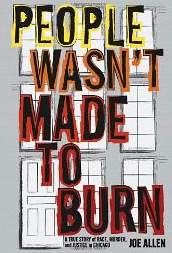
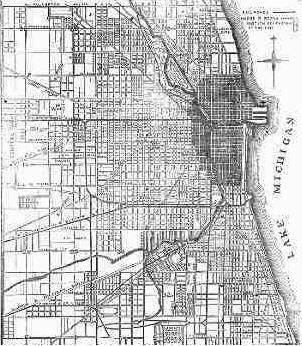
People Wasn’t Made to Burn – Joe Allen
People Wasn’t Made to Burn is a shocking personal story of a Mississippi Black share cropping family that faced incredible hardship and tragedy after moving to Chicago in 1947. Within the year, 4 of their infant children perished in a massive blaze in an overcrowded tenement. The father sickened with grief took justice in his own hands and shot the landlord, thought to have the set the fire. James Hickman was jailed and facing murder charges. The story takes off, author Joe Allen gives the reader an inside look into the strategy to defend Hickman in the most racist area of the country.
Joe Allen:
- I think his story is really symbolic of a whole generation of African Americans who left the South for the North or the West to find a better life and a measure of dignity and freedom.
- He came to Chicago and permanently settled here in 1945. He got a job in the steel industry which was very typical of African American men who came to the Midwest.
- While you were sort of welcomed here for the hard work and labor you would give particularly to the big steel plants, finding a home was the thing which was a source of incredible frustration and humiliation.
- Housing is the whole that Joe Hickman’s trial really revolves around.
- The African American population really up until the second world war, was really confined to a thin sliver of land on the south side of the city (Chicago)
- It was overcrowded, and what the banks do is try to use this limited space to make as much money as possible.
- Kitchenette apartments, one room hovels, that didn’t have running water, no electricity, rat infested.
- Richard Wright’s book – Native Son.
- James Hickman would go from one end of the city to the other looking for a place and would have the door slammed in his face each time.
- Black landlords were not very common at that time. Coleman took his money and never gave the apartment that he wanted. When James Hickman raised the issue of what happened with the money, Coleman threatened to set fire to the place.
- On January 16, 1947, a fire breaks out, it spread so quickly that Annie Hickman, the mother and wife, and one of the eldest sons, made it out of their attic apartment and jumped to safety.
- Because of the speed of the fire and incredible smoke, the four youngest kids, they suffocated and burned to death.
- Six months to the day of the death of children, he confronted Coleman at his home.
- The police acted very quickly in this case. He faced execution in the electric chair or minimum 14 years in prison.
- They pulled together a Hickman defense committee. They organized a very broad based campaign.
- Even though he was a man racked by grief he went out to find some measure of justice for his children when he couldn’t get that from the criminal justice system.
- Housing is still a crucial issue for working class people.
Guest – Joe Allen, a frequent contributor to the International Socialist Review and a long-standing activist, based in Chicago.
——————————————————–

















